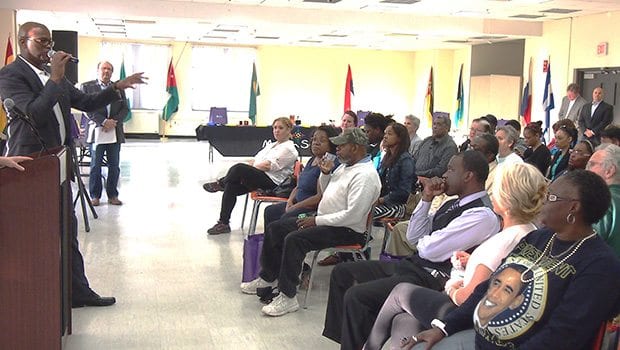
There are no safe bets in the push for a casino in the Boston area.
In November of last year, East Boston residents soundly rejected plans for a casino on the grounds of the Suffolk Downs race track in a neighborhood-wide ballot. Revere voters approved the plan and the city pushed forward with plans to build a casino on the 40 acres of Suffolk Downs located on their side of the municipal boundary.
That casino plan, advanced by Mohegan Sun is vying with a plan for a casino in Everett, being advanced by gambling magnate Steve Wynn.
Plans for casinos across Massachusetts may come to a halt if the state’s Supreme Judicial Court rules in favor of allowing a question on the November ballot that would repeal gaming in Massachusetts.
With a potential vote looming, the potential of thousands of casino jobs and an ongoing public discourse on the negative effects of casinos on low-income communities — crime, addiction, foreclosures — black elected officials and black community organizations in Boston have been largely absent from the casino debate.
But the casinos have not been absent from the black community. In spite of the uncertainty, casino developers are pushing ahead with job fairs and vendor meetings in Revere, in Roxbury and in the cities and towns within a 15-mile radius of the proposed Suffolk Downs casino site. Under the Massachusetts casino law, 20 percent of a casino’s jobs will go to residents of the host community and 75 percent to the communities within the 15-mile radius.
The casino plans for Everett and Revere would both include all of Boston in their respective 15-mile radii.
“You’re within the 15-mile radius,” Mohegan Sun executive Peter Schultz told a gathering of about 80 job seekers at Roxbury Community College last week. “It’s good that you’re here tonight.”
While Mohegan Sun managers and executives gave an overview of the proposed Revere casino, managers of table games, slots, food services and other casino operations stood at the back of the room, prepared to answer questions from prospective job applicants.
In all, the casino plans to hire 4,000 people for operational jobs by the 2017 projected opening date.
In addition to job fairs in Roxbury and Dorchester, Schultz said Mohegan Sun is planning meetings with potential vendors about service contracts with the casino.
“It’s about jobs and what we purchase in goods and services,” he said. “The requirements that we do business with local vendors is unique to the Massachusetts casino law.”
Whatever the economic benefits, the casinos will also bring social costs, opponents argue.
“Should casino gambling come to Massachusetts, the state will be creating new problem gamblers,” said Laura Everett, executive director of the Massachusetts Council of Churches. “I’m not convinced that we’ve got the resources to deal with the increased foreclosures, increased crime and addiction. Our social service agencies and our churches can’t absorb the thousands of gambling addicts that will be created with new casinos.”
Everett and other casino opponents point to Atlantic City and Detroit, two cities where they say casinos have failed to spark economic development. They point to a different 15-mile radius around casinos — one where gambling addiction is five times more likely.
“It’s not just going to have an impact on Revere; it’s going to have city-wide impacts,” said Rev. David Searles, pastor of the Central Assembly of God in East Boston.
Searles says the number of gambling addicts — those who cannot control their impulse to gamble — will increase if the Revere or Everett project go forward, potentially wreaking havoc on low-income communities in the Greater Boston area.
While black elected officials have not come out against the casinos, City Councilor Charles Yancey says blacks should be paying attention.
“People of color have just as much at stake as everyone else,” he said. “For the city itself, there could be a net gain of revenue. But the costs to families could be significant, particularly if we don’t have services in place to help with gambling addiction.”
Under the state’s gaming law, the Massachusetts Council on Compulsive Gambling and other organizations that work with addiction services are slated to receive a portion $20 to $25 million the state is expected to receive from a 5 percent gambling addiction tax on Massachusetts casinos.
Gambling addiction may not be as much of a problem in Massachusetts if anti-casino activists prevail in their efforts to secure a ballot question that would bar the state from licensing casinos.
The activists were able to collect enough signatures to secure a spot on the November ballot for their question, but Attorney General Martha Coakley blocked the ballot measure, stating that the repeal would void implied contracts between the casino companies and the state.
Now with the matter in the Supreme Judicial Court, the controversy over the casinos is as hot as ever. Last week state Gambling Commission Chairman Stephen Crosby recused himself from voting on licensure for the Everett and Revere casino proposals, which are vying for the sole Eastern Massachusetts license to be issued by the state.
Also last week the Boston Globe disclosed that Supreme Judicial Court Justice Robert Cordy represented Suffolk Downs as a lobbyist and lawyer in the 1990s.
Searles remains optimistic the casino opponents will prevail, pointing to the 2008 ballot question that banned dog racing in Massachusetts.
“We put an existing dog racing track out of business, yet there’s this idea that without any building in the ground we can’t stop casinos,” he said. “It seems like common sense has gone out the window.”







